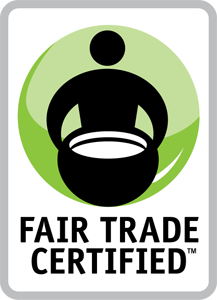Fair Trade | What it Means
Many of our healthiest and most popular foods—bananas, quinoa, Brazil nuts, cocoa, coffee, etc.—are imported from developing countries around the world. Producers of these goods have traditionally been impoverished individuals, families, and communities, such as poor farmers, but their situation is changing, thanks to Fair Trade.
“Fair trade” refers to sourcing products in ways that help producers achieve better trading conditions and that protect the environment by supporting practices such as sustainable farming.
One objective of fair trade is expressed by the slogan “Trade not Aid.” This is the goal of helping developing nations by buying their products, rather than by simply throwing money at them. One issue with traditional charity practices is that they can be prone to abuse; funds intended for the needy can end up in the hands of politicians and crime lords.
 Fair trade circumvents this problem!
Fair trade circumvents this problem!
Fair trade crops are typically grown and harvested in small quantities; thus, farmers are involved with and invested in food production. As a result, fair trade food tends to be fresher and tastier than foods grown in huge factory-farming operations.
Fair trade also encourages win-win international trading partnerships via effective and respectful two-way interactions. This means the benefits of commerce and non-exploitive prices are delivered to exporters around the world, while fresh and tasty foods are delivered to end consumers.
Fair trade products have grown in popularity in the past decade. Indeed, a 2013 study by the Nielsen market research company in the UK found that 25 percent of consumers would buy Fair trade products even if doing so cost them more money.
According to Paul Rice of Fair Trade USA (the leading American third-party fair trade certifier), through participation in fair trade, farming families around the world have gained millions in income, resulting in community development programs for improved education and health care.
Rice concludes, “As consumer demand for ethically produced goods increases, we’re able to chip away at the cycle of poverty that plagues farming communities around the world.”
Green Nature Marketing and our sustainable brands are committed to supporting the foodservice community. We appreciate any opportunity to work with the established foodservice distribution supply chain to accommodate our customer’s needs for excellent customer service. If you are interested in learning more about our brands or have questions regarding our company, please get in touch via email at communications@greennaturemktg.com or through our website, https://greennaturemktg.com/contact/.
*Feature image provided by the World Fair Trade Organization






